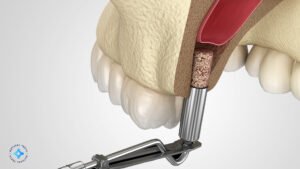Losing a tooth can be more than just a cosmetic concern—it can affect your confidence, oral function, and even your jawbone health. Fortunately, single tooth dental implants offer a permanent, natural-looking solution that blends seamlessly with your smile. Unlike traditional bridges or dentures, implants provide stability, prevent bone loss, and protect your remaining teeth.
But what exactly does getting a single tooth implant involve? How does it compare to other tooth replacement options? And who is the ideal candidate for this procedure? In this comprehensive guide, we’ll answer all your questions, explore the benefits, and break down the process step by step.
What Is a Single Tooth Dental Implant?
A single tooth dental implant is a standalone replacement for a missing tooth, consisting of three key components:
-
Titanium Implant Post – Surgically placed into the jawbone, acting as an artificial tooth root.
-
Abutment – A connector that attaches the implant to the crown.
-
Custom Crown – A tooth-colored prosthetic designed to match your natural teeth.
Unlike dental bridges, which rely on neighboring teeth for support, an implant preserves your natural tooth structure while providing unmatched durability.
Why Choose a Single Tooth Implant Over Other Options?
When replacing a missing tooth, patients often consider bridges or removable partial dentures. However, single tooth implants offer several long-term advantages:
-
Preserves Adjacent Teeth – No need to grind down healthy teeth for support.
-
Prevents Bone Loss – Stimulates the jawbone, maintaining facial structure.
-
Long-Lasting Solution – With proper care, implants can last a lifetime, while bridges may need replacement every 10–15 years.
-
Natural Look & Feel – Functions and blends in like a real tooth.
The Step-by-Step Single Tooth Implant Process
-
Consultation & Evaluation – A CBCT scan assesses bone density and determines implant placement.
-
Implant Placement – The titanium post is inserted into the jaw under local anesthesia.
-
Healing & Osseointegration – The implant fuses with the bone over 3–6 months.
-
Abutment & Crown Attachment – A custom crown is secured, completing your smile.
Who Is a Good Candidate for a Single Tooth Implant?
Ideal candidates have:
-
Sufficient Jawbone Density – If bone loss has occurred, a bone graft may be needed.
-
Healthy Gums – No active periodontal disease.
-
Good Overall Health – Conditions like uncontrolled diabetes may affect healing.
Single Tooth Implant vs. Dental Bridge: Which Is Better?
While bridges are a quicker fix, they come with drawbacks:
-
Shorter Lifespan – Typically lasts 10–15 years vs. implants, which can last decades.
-
Tooth Alteration Required – Adjacent teeth must be filed down.
-
Bone Loss Risk – Without a root replacement, the jawbone deteriorates over time.
For a more durable, bone-preserving solution, implants are often the superior choice.
How to Care for Your Single Tooth Implant
Maintaining an implant is similar to caring for natural teeth:
-
Brush & Floss Daily – Prevent plaque buildup around the implant.
-
Regular Dental Checkups – Ensure long-term success with professional cleanings.
-
Avoid Hard Foods – Excessive force can damage the crown.
Frequently Asked Questions About Single Tooth Implants
-
How long does the entire process take?
Typically 3–6 months, including healing time. -
Is the procedure painful?
Local anesthesia ensures minimal discomfort; most patients report mild soreness afterward. -
Can I get an implant if I have bone loss?
Yes, a bone graft can rebuild the jawbone to support an implant. -
Will the implant look natural?
Absolutely—the crown is custom-made to match your surrounding teeth. -
How much does a single tooth implant cost?
Prices vary, but financing options are often available. -
What’s the success rate of dental implants?
Over 95% with proper care. -
Can an implant fail?
Rarely, but smoking, poor oral hygiene, or medical conditions can increase risks. -
How soon can I eat normally after surgery?
Soft foods are recommended initially; normal chewing resumes after full healing. -
Are implants covered by insurance?
Some plans offer partial coverage—check with your provider. -
Can I get an implant the same day as extraction?
In some cases, immediate implants are possible.
Conclusion:
Is a Single Tooth Implant Right for You?
If you’re looking for a permanent, natural-looking solution to replace a missing tooth, single tooth dental implants offer unmatched benefits. From preserving jawbone health to restoring full chewing function, they provide a long-term investment in your smile.
At Natural Teeth Implant Center, our expert team ensures a seamless, comfortable experience with cutting-edge technology and personalized care.






